Agriculture is the base of Pakistan’s economy. Understanding the importance of agriculture in Pakistan helps everyone from farmers and traders to policymakers to see how it shapes food, jobs, and growth. This sector supplies food, raw materials, creates jobs, supports rural life, and fuels industry. Moreover, because agriculture is closely tied to exports and national food security, its health affects all people in Pakistan.
Overview and Economic Role
First, agriculture provides income and work for a large share of Pakistan’s population. The agriculture contribution to GDP of Pakistan remains high: in the fiscal year (FY) 2024–25, agriculture made up about 23.54% of GDP. Pakistan economic survey
Second, it employs over a third of the workforce. About 36.1% of total employment is in agriculture. Helgi Library+1
Third, agriculture supports allied sectors such as textiles, food processing, fertilizer, and livestock. When farming grows, inputs are supplied, factory demand rises, and rural incomes increase.
The agriculture contribution to the GDP of Pakistan, therefore, isn’t only a number. It is a core measure for planning. If productivity improves, imports can fall, exports can rise, and prices stabilize.
Current Situation of Agriculture in Pakistan
The current situation of agriculture in Pakistan shows both promise and challenges. There was a strong overall growth of 6.25% in FY2023-24 in the agriculture sector. Growth in important crops was even higher. Wheat rose, rice rose, and cotton production rebounded. Profit by Pakistan Today
Yet, the current situation of agriculture in Pakistan also faces constraints:
- Water scarcity and inefficient irrigation
- Old machinery and low mechanization
- Limited access to finance for small farmers
- Soil degradation and climate shocks like floods, droughts
- Fragmented land holdings, which reduce economies of scale
These issues reduce yield and raise costs.
Technology and Modernisation
Modern tools and systems are part of the solution. Agriculture technology in Pakistan is being adopted more widely, such as weather forecasting apps, sensors, and mobile advisory services. These help farmers decide when to plant, when to irrigate, and when to apply pesticides.
Furthermore, agriculture technology in Pakistan also includes digital platforms that connect farmers to buyers and markets, helping them get better prices and reduce middleman losses.
Training, affordable access, and infrastructure are needed so small farms can benefit too.
Precision Tools: Drones, Smart Farming
Modern tools like drones are transforming how farms are managed. Agriculture drones in Pakistan are being trialled for crop monitoring, spraying, and mapping. They help identify stressed areas quickly, reduce chemical usage, and allow faster response after floods or extreme weather. Research shows the potential of these tools to map soil moisture, pest infestations, and field health can transform the sector. academia.edu.pk
At the same time, smart farming in Pakistan employs IoT, sensors, automation, and data analytics. Systems like precision irrigation and automated greenhouses improve water use and yield. Smart farming in Pakistan also improves traceability, which is important for export crops.
All these advances feed into precision agriculture in Pakistan, where inputs (water, fertilizer, seed, pesticide) are applied in the right place, at the right time, and in the right amount. Precision agriculture in Pakistan reduces waste, increases the quality of output, and can raise incomes while protecting the environment.
Policy Priorities and Institutional Support
To leverage the importance of agriculture in Pakistan, policy and institutions must support modernisation.
- Improve extension services and farmer training so agriculture technology in Pakistan reaches all levels
- Subsidize or offer cost-sharing for agriculture drones in Pakistan to reduce upfront costs
- Provide low-interest credit or loans for farmers to adopt smart farming in Pakistan tools
- Ensure fair prices and stable access to inputs
Also, water policy reform is urgent. Poor irrigation limits the agriculture contribution to GDP of Pakistan. Upgrading canals, promoting micro-irrigation, and watershed management are necessary.
Public–private partnerships can help scale precision agriculture in Pakistan by sharing data, sharing costs, and developing infrastructure like cold chains and storage.
Social and Environmental Benefits
The importance of agriculture in Pakistan goes beyond economics. It supports rural livelihoods, reduces poverty, and helps social stability since many people depend directly or indirectly on farming.
Moreover, sustainable practices (such as precision farming) protect soil, water, and biodiversity. They reduce harmful chemical runoff and improve food safety.
Environmental resilience is important, especially since climate change is already impacting farming.
Recommendations and Way Forward
To reinforce the importance of agriculture in Pakistan, the following steps matter:
- Expand education and training so farmers learn modern techniques
- Improve credit access so farmers can invest in agriculture technology in Pakistan and agriculture drones in Pakistan without heavy debt.
- Make policies that reward sustainability and resource efficiency (aligned with Smart farming in Pakistan)
- Strengthen infrastructure, roads, cold storage, and market access to allow better value capture.
- Create regulations and guidelines for precision agriculture in Pakistan so that data, drones, and sensors are used safely and fairly.
- Foster research and innovation in agriculture, especially in climate-smart crops and resilient farming methods
Conclusion
In sum, the importance of agriculture in Pakistan is immense. Agriculture remains central to food security, exports, and rural employment. By adopting agriculture technology in Pakistan, scaling up smart farming, the sector can grow more sustainably. Additionally, with strong policies, better institutions, and public-private cooperation, the contribution to GDP can increase. Finally, Precision agriculture in Pakistan offers a path to higher yields, environmental protection, and improved livelihoods. Thus, agriculture is not only a sector but also the foundation for Pakistan’s economic stability and growth.
- “Agriculture sector share rises to 23.54% of GDP in FY25,” PK Revenue, June 2025. Pkrevenue.com
- “Agriculture shows 6.25pc growth,” The News, Pakistan, 2024. The News International Profit by Pakistan Today
- “Agriculture contribution to GDP and Employment stats,” FAO Pakistan, “Pakistan at a Glance.” FAOHome
- “Employment in Agriculture (as % of Total Workforce) in Pakistan,” World Bank data / Helgi Library, 2023. Helgi Library
